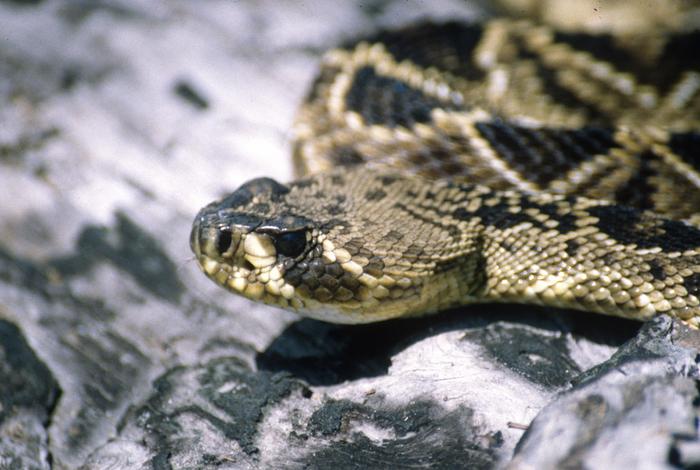American Geophysical Union
Press Release No. 23-27
For Immediate Release
11 July 2023

Credit: Lawrence Wilson
American Geophysical Union
Press Release No. 23-27
For Immediate Release
11 July 2023
This press release is available online at: https://news.agu.org/press-release/warmer-weather-makes-venomous-snake-bites-more-likely-especially-in-spring
AGU press contact:
Rebecca Dzombak, [email protected], +1 (202) 777-7492 (UTC-4 hours)
Emory University press contact:
Rob Spahr, [email protected] (UTC-4 hours)
Interview requests should be sent to Rob.
WASHINGTON — Climate change is not only making Georgia hotter but also increasing the likelihood of snake bite, according to a new study. Every degree Celsius of daily temperature increase corresponds with about a 6% increase in snake bites, researchers found. The results are published in GeoHealth, which publishes research investigating the intersection of human and planetary health for a sustainable future.
Snakes are cold-blooded animals, so they are generally more active in warmer weather. And globally, temperatures are rising.
“Venomous snake bites are classified by the World Health Organization (WHO) as a high-priority neglected tropical disease,” said Noah Scovronick, a health and environmental scientist at Emory University who led the new study. Around the world, approximately 5 million people are bitten by snakes every year, and of those up to 138,000 people die, according to the WHO.
“We don’t know much about how weather — meaning short term changes in meteorology — drive human-snake interactions, partly because a lot of dangerous snake bites occur in places that lack good data on causes of morbidity and mortality,” Scovronick said.
Within the United States, Georgia is something of a snake hotspot, with one of the highest snake densities and diversities in the country. The state is home to 17 species of venomous snake, seven of which are dangerous enough to be of medical concern.
Scovronick and his colleagues analyzed statewide hospital data from 2014 to 2020, during which time there were 3,908 hospital visits due to venomous snake bites. They statistically compared hospitalizations to daily weather records, searching for strong associations between factors such as minimum and maximum air temperature, precipitation and humidity and snake bites. In their analysis, the researchers controlled for both the month and day of the week the bite occurred, which accounts at least partially for variability in human activity.
The occurrence of venomous snake bites was associated with increased maximum daily air temperatures, the researchers found. While summers had the highest numbers of snake bites, spring had the strongest association between temperatures and snake bites.
Scovronick speculated that the spring association could be because snakes “wake up” during that season, becoming more active and reproducing, while summer days could reach temperatures warm enough to slow snakes down. But that needs further exploration with species-level detail, he said. Other meteorological factors, such as humidity, had weaker or no associations with the rate of venomous snake bites.
The study did not include predictions for how snake bites could change in the future, and Scovronick emphasized the need to carry out similar studies in other states to get a nationwide picture of risk. “We can learn a lot about snake bite patterns even with fairly modest data and using established epidemiological methods,” he said. “This study demonstrates that.”
Just because Georgia is getting warmer doesn’t necessarily mean more people will be hospitalized because of venomous snake bites.
“The key factor to reducing negative encounters is education,” said Lawrence Wilson, a herpetologist at Emory University who was a co-author of the study. “Let people know what habitats snakes favor, such as places with dense groundcover, and they can be wary of such habitats. Snakes and people can live compatibly, even venomous snakes, as long as we respect and understand their habitats and needs.”
But between climate change heating up the state and urban areas expanding, the odds of people encountering snakes are already increasing, according to Wilson.
“As human development in Georgia and especially the Atlanta area are expanding rapidly, human-snake encounters are going to continue to increase and already have,” Wilson said. “Almost anyone who spends a lot of time outdoors will have encountered a copperhead or other venomous snake.”
The specific findings only relate to Georgia, but they highlight a pressing need for similar studies to be done in other parts of the world with different climate regimes and snake species, Scovronick said.
#
Notes for journalists:
This study is published in GeoHealth, a fully open-access journal. View and download a pdf of the study here.
Paper title:
“The association between ambient temperature and snakebite in Georgia, USA: a case-crossover study”
Authors:
- Mariah Landry, Stefanie Ebelt, Noah Scovronick (corresponding author), Gangarosa Department of Environmental Health, Rollins School of Public Health, Emory University, GA, USA
- Rohan D’Souza, Shannon Moss, Howard H. Chang, Department of Biostatistics and Bioinformatics, Rollins School of Public Health, Emory University, GA, USA
- Lawrence Wilson, Department of Biology, Emory University, GA, USA
Journal
GeoHealth
DOI
10.1029/2022GH000781
Article Title
The association between ambient temperature and snakebite in Georgia, USA: a case-crossover study
Article Publication Date
11-Jul-2023




